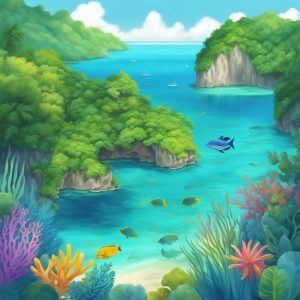Palau Island People: A Look into the Culture and Traditions of the Indigenous Community

Palau is a small island nation located in the Pacific Ocean. The people of Palau are a mix of various ethnic groups, including Melanesian, Micronesian, Austronesian, Japanese, and Filipino. The country’s population is estimated to be around 20,000, with the majority of the people living in the capital city of Ngerulmud and the nearby town of Koror.
The history of Palau is a complex one, shaped by colonialism, war, and political upheaval. Despite this, the Palauan people have managed to maintain a strong sense of cultural identity and traditions. Today, Palau is a sovereign state with a democratic government and a growing economy based on tourism and fishing. In this article, we will explore the fascinating world of Palauan culture and society, and learn more about the people who call this island nation home.
Key Takeaways
- Palau is a small island nation located in the Pacific Ocean, with a population of around 20,000 people.
- The people of Palau are a mix of various ethnic groups, including Melanesian, Micronesian, Austronesian, Japanese, and Filipino.
- Despite a complex history, the Palauan people have managed to maintain a strong sense of cultural identity and traditions.
History and Demographics
Pre-Colonial and Colonial Eras
Palau has a rich history dating back to the pre-colonial era when the indigenous people, the Palauans, first settled on the islands. The Palauans were skilled navigators and fishermen, and their society was organized around clans and chieftainships.
In the 16th century, the Spanish arrived in Palau and claimed the islands for the Spanish Empire. The Spanish influence on Palauan culture was minimal, and they did not establish a permanent settlement on the islands.
In the late 19th century, Palau was sold to Germany and became part of German New Guinea. During the German colonial period, the Palauans were forced to work on plantations and the construction of infrastructure. The Germans also introduced Christianity to the islands, and many Palauans converted to Catholicism.
World Wars Impact
During World War I, Japan seized control of Palau, along with other German colonies in the Pacific. Under Japanese rule, Palau underwent significant development, with the construction of roads, schools, and hospitals. However, the Palauans were subjected to forced labor and other forms of oppression.
During World War II, Palau was the site of a major battle between the United States and Japan. The battle resulted in significant damage to the islands and many civilian casualties.
Population and Ethnic Groups
Today, Palau has a population of around 17,600 people, with the majority being Palauan. The Palauans are the indigenous people of the islands and make up around 70% of the population. Other ethnic groups in Palau include Filipinos, Japanese, and other Micronesian groups.
The Palauan language is the official language of the country, but English is widely spoken and is used in government and education. The majority of the population is Catholic, with smaller numbers of Protestants and other religions.
Government and Politics
Political Structure
Palau is a presidential representative democratic republic. In this system, the President of Palau is both the head of state and the head of government.
The Republic of Palau has a multi-party system, and the two main political parties are the People’s Party and the United Democratic Party.
The President and the Vice President are elected by popular vote for a four-year term, and they can serve up to two terms.
The Palau National Congress is the legislative branch of the government, and it consists of two houses: the Senate and the House of Delegates.
The Senate has 13 members, two from each state, and one from the Palau National Capital District. The House of Delegates has 16 members, elected by popular vote for a four-year term.
International Relations
Palau has a unique relationship with the United States, which is defined by the Compact of Free Association. The Compact was signed in 1986 and came into effect in 1994, when Palau gained its independence from the United States.
Under the Compact, the United States provides Palau with financial assistance, defense, and other services, in exchange for exclusive military access to the islands.
Palau is also a member of the United Nations, the Pacific Islands Forum, and the Secretariat of the Pacific Community. Palau maintains diplomatic relations with many countries, including Japan, Taiwan, and Australia.
Legal System and Sovereignty
The Palau Constitution is the supreme law of the land, and it was adopted in 1981. The Constitution provides for the separation of powers, and it establishes the framework for the government and the legal system.
The Palau Supreme Court is the highest court in the land, and it has both original and appellate jurisdiction.
Palau is a sovereign nation, with its own government, laws, and economy. The Compact of Free Association with the United States provides for a number of shared responsibilities, including defense and foreign affairs. Palau has the right to enter into international agreements, and it maintains its own foreign policy.
Culture and Society
Palau is a country with a rich culture and society that is influenced by its history, geography, and people. The Palauan people are a mix of Melanesian, Micronesian, Austronesian, Japanese, and Filipino descent, and they have their own unique customs and traditions that have been passed down through generations.
Language and Ethnicity
The official languages of Palau are Palauan and English, and both are widely spoken throughout the country. Palauan is a member of the Austronesian language family and is spoken by the majority of the population. It is a complex language with a unique grammar and syntax.
Ethnic Palauans predominate, inhabiting the main islands of the archipelago. Descendants of the Carolinean atolls, especially Ulithi, settled on Palau’s southern atolls of Hatohobei, Sonsorol, Fannah, Pulo Anna, and Merir.
Religion and Beliefs
The majority of Palauans are Christians, with Roman Catholics and Protestants representing the largest religious groups. Modekngei is a traditional religion that is still practiced by some Palauans. Modekngei emphasizes the importance of respecting the environment and living in harmony with nature.
Traditions and Inheritance
Palauan culture is matrilineal, meaning that inheritance and family lineage are traced through the mother’s side of the family.
Clan is the basic social unit of Palauan society, and each clan has its own unique traditions and customs. Elders are highly respected in Palauan culture, and their wisdom and experience are valued by the community.
Palauan traditions include dance, music, and storytelling. Traditional dances are often performed during festivals and special occasions, and they are accompanied by music played on traditional instruments such as the kulintang and the gong.
Storytelling is an important part of Palauan culture, and myths and legends are passed down through generations to teach important lessons and values.
Economy and Environment
Palau’s economy relies heavily on tourism and fishing, which are both heavily dependent on the country’s natural resources. As such, the government of Palau has implemented various measures to protect the environment and ensure sustainable use of its resources.
Natural Resources
Palau is rich in natural resources, including fish, forests, and minerals. Fishing is an important industry, providing both income and food for the islanders.
The country’s forests are also an important resource, providing timber for construction and other purposes. However, due to the country’s small size, these resources are limited, and the government has implemented measures to ensure their sustainable use.
Tourism and Development
Tourism is the main driver of Palau’s economy, accounting for over 50% of the country’s GDP. The country’s pristine beaches, clear waters, and diverse marine life make it a popular destination for tourists.
However, the government has also recognized the potential negative impacts of tourism and has implemented measures to mitigate these impacts.
For example, the government has limited the number of tourists allowed on certain islands and has implemented strict environmental regulations for tourism-related activities.
Environmental Conservation
Palau’s government has made environmental conservation a top priority.
In 2015, the country declared a marine sanctuary covering 80% of its exclusive economic zone, making it one of the largest marine protected areas in the world.
The country has also implemented measures to protect its forests and other natural resources.
In addition, the government has launched various initiatives to promote sustainable development, such as the Palau Pledge, which encourages visitors to the country to act responsibly and protect the environment.
Frequently Asked Questions
What is the population of Palau?
Palau has an estimated population of 21,779 as of 2023. The ethnic groups in Palau are Palauan (Micronesian with Malayan and Melanesian admixtures), Carolinian, Asian, and other. Palauan is the official language in most islands, followed by other Micronesian languages, English, Filipino, Chinese, and other languages.
What languages are spoken in Palau?
Palauan is the official language on most islands of Palau. Other Micronesian languages, English, Filipino, Chinese, and other languages are also spoken in Palau.
Who is the current President of Palau?
As of 2024, the current President of Palau is Surangel Whipps Jr. He was elected as the tenth President of Palau in 2020.
What type of government does Palau have?
Palau has a presidential representative democratic republic type of government. The President is both the head of state and the head of government. There is a bicameral legislature consisting of the Senate and the House of Delegates.
What currency is used in Palau?
The official currency of Palau is the United States dollar (USD). The US dollar is widely accepted and used in Palau. There are ATMs and banks available for currency exchange.
What are the cultural traditions of the indigenous people of Palau?
The indigenous people of Palau have a rich culture and tradition. Some of the cultural practices include traditional dances, music, and crafts.
The Palauan traditional dance is called the “Tibetan Dance.” It is performed during special occasions such as weddings and festivals.
The Palauan people also have a strong connection to the ocean. Fishing is an important part of their culture.
The traditional Palauan outrigger canoe, known as the “outrigger canoe,” is still used for fishing and transportation in some parts of Palau.
